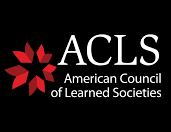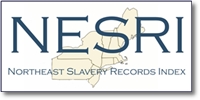
This project is funded by an American Council of Learned Societies Digital Justice grant.
The Northeast Slavery Records Index (NESRI) is supporting a set of small contracts for academic and public historians to locate, organize and index additional digital records documenting enslavement in NESRI’s eight northeastern states from New Jersey to Maine. Begun in 2017 and permanently located at https://nesri.commons.gc.cuny.edu/, NESRI is an ongoing digital public history initiative that currently indexes over 64,000 original records of slavery from the 1500s through the 1860s. NESRI provides customizable reports that are free and accessible online to scholars, students and the general public. This “Small Contracts” project is funded through a grant by the American Council of Learned Societies Digital Justice Grant, and the projects are expected to add at least 6,000 new records to the NESRI database.
Project Overview: NESRI is proud to have located and indexed over 64,000 records of slavery from our states, but we know that there are thousands of records still to be located and indexed. Until recently slavery in the Northeast states was forgotten or ignored. Many of the records that are foundational to academic and community-based studies of local slavery are lost, misplaced or misunderstood. Our projects will restore names and identities to many enslaved people and hold their enslavers to account. The ACLS grant allows NESRI to inform additional communities about their histories of enslavement, based on new, documentary evidence.
NESRI has funded the following projects:
- Witness Stones Project, Inc, Dennis Culliton, Executive Director: This project would be to capture the data from CT Church Records Indexes found across Connecticut, at the CT State Library, and online at Ancestry.com. The main records we will be using are the published Connecticut Church Records Indexes which list the names of church members alphabetically by date and event (such as marriage, baptism, and burial). These records mostly focus on Congregational Churches in Colonial and Early American Connecticut but also some Anglican/Episcopal Churches. The project will employ a graduate assistant from Central Connecticut State University’s Public History program.
- Wayne Tucker, independent writer and historian, Rockland Massachusetts, and creator of Eleven-Names.com: This project will identify records of enslaved people in New England Historic Genealogical Society’s (NEHGS) AmericanAncestors.org database and in documents in their special collections which have not been indexed. Wayne Tucker has already done this for towns in Plymouth County Massachusetts.
- Jennifer Galpern, Research Services Manager at the Rhode Island Historical Society (RIHS) Robinson Research Center: This project will expand the Rhode Island Historical Society (RIHS) working spreadsheet document (already indexed in NESRI as to enslaved named people) called “The Guide to People of Color in the RIHS Manuscripts Collection.” The goal is to expand the guide by identifying additional enslaved people in the RIHS Manuscripts collection.
- Monmouth County Historical Association (MCHA): This project will locate, identify, and collate a minimum of 500 records of enslaved people in New Jersey. The MCHA team will include Executive Director Shannon Eadon, Digital Archivist Dana Howell, Author Rick Geffken, and Associate Curator Joe Zemla. Although many New Jersey counties have published lists of enslaved people post-1804 (when the Act for the Gradual Abolition of Slavery was enacted in the state), hundreds of other enslaved people are mentioned by name in individual Wills/Last Testaments, Bills of Sales, property inventories, personal correspondences, runaway slave ads, cemetery records, private collections, etc.
- Jesse Bayker, Research Project Manager / Digital Archivist at the Scarlet and Black Research Center at Rutgers University: This project will focus on indexing county records pertaining to the births, manumissions, and removals (interstate relocations) of enslaved individuals from New Jersey in the early decades of the nineteenth century. These records were maintained in bound volumes by each county clerk in New Jersey pursuant to the 1804 Act for the Gradual Abolition of Slavery. The records are held at the State Archives in Trenton and at several smaller archives, available variously as original bound volumes or microfilm copies. Initial focus will be the records for Middlesex County, which have been partially transcribed by Rutgers University researchers and will be published as part of the Scarlet and Black Digital Archive in the fall of 2022.
- Joseph Zemla, Independent Historian: Joe Zemla will index and code the records of runaway ads pertaining to enslaved people of New Jersey from two sources: Graham Russell Hodges “Pretends to be Free” and Richard Marrin’s “Runaways of Colonial New Jersey.” While no source can be considered a definitive source, these two books contain the largest repositories of records originating in the colonial-era papers and gazettes of New Jersey, Pennsylvania, and New York.
- Lorna Smedman, an independent historian in Ulster County NY will be searching for birth registration records in Ulster County towns where enslavement was extensive. Lorna is the head researcher for a NEH-funded project focused on the history of two black and mixed-race families in Ulster County.
- Deborah Jenkins, in independent historian residing in the Bronx with a doctoral degree in Divinity, will be indexing records of enslavement from all of the northeast universities and colleges, including both enslavement records and underground railroad records. The project will enable NESRI to provide a university/college table in our locality reports, along with a specialized university/college search report.
- Walter Greason, formerly of Monmouth University and now a professor at Macalester University, will be researching slave trade records from many sources, particularly shipping records for rosters of enslaved people.
NESRI has also received a separate grant for the development of the John Jay College “Slavery Records Indexing and Analysis Unit” (SRIAU). SRIAU is administered by a faculty supervisor and 4 students who locate records, code them into the Northeast Slavery Records Index (NESRI), analyze them and create essays about their findings. Student research and explanatory essays may appear on NESRI’s website.



